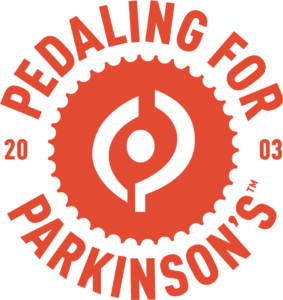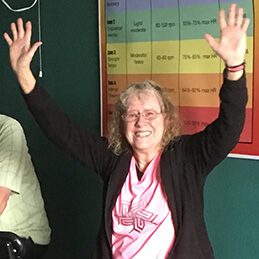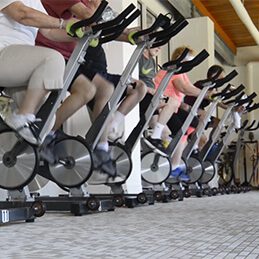
Pedaling for Parkinson’s™
The Pedaling for Parkinson’s™ program is based on research indicating that forced exercise on a bicycle can reduce symptoms of Parkinson’s. In fact, participants who ride three days a week over eight weeks have shown improvement in their Parkinson’s-related symptoms by as much as 35%.
For convenience, most programs are offered on indoor, stationary bikes and hosted at local YMCAs, gyms, or other community spaces. Learn more about whether this program might be right for you as well as how to join in-person or online classes by exploring the pages below or download our Rider Guide.
About Pedaling for Parkinson’s

The Pedaling for Parkinson’s program is based on research indicating that forced exercise on a bicycle can reduce symptoms of Parkinson’s. The protocol includes a one-hour ride with:
- a 10-minute warm-up at 60 rotations per minute (RPMs)
- 40 minutes at 80 RPMs
- a 10-minute cool down at 60 RPMs.
For convenience, most programs are offered on indoor, stationary bikes and hosted at local YMCAs, gyms, or other community spaces.
Participants who ride three days a week over eight weeks have shown improvement in their Parkinson’s-related symptoms by as much as 35%. Classes usually meet on Mondays, Wednesdays, and Fridays or on Tuesdays, Thursdays, and Saturdays.
A typical Pedaling for Parkinson’s class includes an instructor and as many participants as bikes are available at each facility. Class sizes range anywhere from three to 30 participants.
- Participants should be able to secure their feet in or on the pedals and maintain a safe and suitable body position to stay on the bike throughout the duration of the class.
- Participants are encouraged to wear proper cycling clothing and bring a water bottle.
- Participants are encouraged to remain seated on the stationary bicycle for the duration of the class.
To learn more and see if Pedaling for Parkinson’s is right for you, download our Rider Guide.
Pedaling For Parkinson’s was founded by Dr. Jay Alberts, a neuroscientist and researcher at the Cleveland Clinic, and Cathy Frazier, a woman living with Parkinson’s. While riding a tandem bike at RAGBRAI in 2003, they discovered that cycling reduced Cathy’s symptoms. With Dr. Alberts guiding the bike and Ms. Frazier on the back, she noticed something interesting after the day’s ride: She felt like she didn’t have Parkinson’s anymore!
This experience led Dr. Alberts to study the effects of aerobic exercise (and cycling in particular) on cognitive and motor function through a project funded by the Davis Phinney Foundation in 2009. The results of that research defined a therapeutic protocol that was subsequently deployed in a few cycling studios across the country. Delivering almost immediate results, the test environments were converted to indoor stationary cycling classes that quickly became available to people living with Parkinson’s, and thus Pedaling for Parkinson’s was born.
Since 2013, Pedaling for Parkinson’s has taken hold in YMCAs, gyms, and other community spaces across the country. Taught by local instructors, these accessible classes engage participants in a simple protocol three times a week and are proven both scientifically and anecdotally to help people with Parkinson’s feel better and live well today.
In 2023, the founder of Pedaling for Parkinson’s, Dr. Jay Alberts, chose the Davis Phinney Foundation to become the stewards of this innovative and effective program. With Davis’s roots in cycling and the Foundation’s history as an advocate for exercise, this was a natural next step to ensure the sustainability and broad availability of this program for people living with Parkinson’s across the country (and, soon, globally).
Dr. Jay Alberts and his colleagues have dedicated 17 years to studying the effects of exercise, primarily forced cycling, on performance in people living with Parkinson’s. Each project has inspired the next, and the research continually support anecdotal evidence that forced and high-intensity aerobic exercise improves motor function (and more) in people with Parkinson’s.
Instructors
Does training cost anything? How long does it take and where is it hosted?
Our training is free to all instructors. The basic, initial training should take no more than two hours (self-paced). It can be done online and is hosted in our training portal: the Mighty Networks online community hub that instructors gain access to after registering.
I’ve been teaching classes for a long time; do I need to do the training? Is there continuing education?
We would love for all Pedaling for Parkinson’s instructors to complete our training! Why? Because our training ensures that:
- Everyone hosting classes understands the research behind and history of the Pedaling for Parkinson’s program.
- All instructors, anywhere in the world, have access to the same information about how to best host a class and work with people with Parkinson’s.
- We can provide continuing education with the understanding that all instructors have the same baseline knowledge.
Additionally, as we continue to expand the program, expect to see a virtual instructor community where instructors can ask questions and connect with one another; this will be hosted on Mighty Networks.
How often do I need to do the training?
Once you complete our initial training, there is no requirement to do it again. You will be notified of ongoing continuing education opportunities through Mighty Networks.
Does The Davis Phinney Foundation require instructors to have any other training or certifications?
The Davis Phinney Foundation does not require additional training certifications; however, we highly encourage instructors to be experienced/certified in spin, group exercise, etc. All instructors should consult with their facility about certification requirements needed to teach group fitness classes.
How flexible is the class protocol?
The general protocol for a Pedaling for Parkinson’s class is as follows:
- 10 min warm up at 40rpm
- 40 min ride at 80-90rpm
- 10 min cool down
We encourage instructors to be familiar with this protocol and closely follow it, as this is the protocol the research proved effective for symptom reduction. That said, there is a little wiggle room for protocol flexibility within community classes. Depending on the ability level of participants, 80-90rpms during the 40 mins ride can be adjusted up or down 5-10rpm. For more advanced classes, intervals within the 75-90rpm range can help keep the class more dynamic.
How do I approach a facility to use their equipment and space?
We have a handful of resources and suggestions you can use to talk to a facility about a Pedaling for Parkinson’s program:
- We encourage you to emphasize that this program is strongly backed by many years of research when talking to facilities about hosting Pedaling for Parkinson’s! Read about the research and research timeline for the Pedaling for Parkinson’s program on our website.
- Our startup guide provides a detailed overview of everything needed to start a Pedaling for Parkinson’s program.
- Address potential costs. The Davis Phinney Foundation does not charge for licensing, marketing, or training. Facilities are responsible for providing bikes, space for the program, and compensating instructors, if that is the agreement made.
- Let facilities know that The Davis Phinney Foundation is overseeing the program and is happy to discuss any questions they may have. They can reach us at [email protected].
Facilities
Is there a cost to sign the licensing agreement? How often does it need to be renewed?
The Davis Phinney Foundation does not charge anything for facilities to license the program; the license does not need to be renewed. The Davis Phinney Foundation will periodically reach out to confirm up-to-date class information and facility contacts.
Do you require signed physician medical release before participants can join?
We do not. While medical releases used to be part of the program, these releases caused a significant administrative burden to facilities and hindered program participation.
If your facility would like to require a medical release, you can do so; however, The Davis Phinney Foundation does not provide this release. In lieu of a medical release, we encourage facilities to keep our Rider Guide on hand, which can be shared with participants. Participants can self-assess their program participation.
Is there a liability form that needs to be signed?
For in-person classes, there is not a Pedaling for Parkinson’s-specific liability form/waiver. Our licensing agreement asks facilities to agree that the Pedaling for Parkinson’s program is covered with their general participant waiver.
Do you recommend any sort of assessment with clients before they join class?
We do not have a specific assessment we require or recommend; however, there are certain questions instructors may ask participants to better understand the support needed.
For example:
- How is your balance getting off and on a stationary bike?
- What do you experience during OFF times?
- Have you done a Pedaling for Parkinson’s class before?
This list is not exhaustive and includes only a few possible questions.
How can facilities offer the class for free and still pay their instructors?
Some ways we have seen facilities offer the class for free while still paying their instructors are as follows:
- Including Pedaling for Parkinson’s in the group exercise catalog and training existing instructors to teach the class
- Utilizing grant funds from local (or national) organizations to support instructor salaries/stipends
- Assessing whether a Silver Sneakers program could be a fit for your facility (*Note: The Davis Phinney Foundation cannot answer specific questions about Silver Sneakers)
Where have people looked for grants to support the program?
There are various forms of funding available at a variety of locations, some of which include:
- Local Rotary and/or Kiwanis clubs
- Regional American Parkinson’s Disease Association (APDA)chapter grant opportunities
- Parkinson’s Foundation
- National Recreation Foundation
Do classes need to happen 3x/week?
While the Pedaling for Parkinson’s research protocol included pedaling 3x/week, we do not have that requirement for community classes. We encourage facilities to host classes whatever number of times per week is sustainable in the long term. Classes hosted once or twice per week are perfectly acceptable. If your facility can only offer the class once or twice per week, point participants in the direction of our Pedaling for Parkinson’s Online classes to add to their weekly routine.
How many instructors can be trained per facility?
There is not a limit on how many instructors can receive the training per facility.
How can The Davis Phinney Foundation help us market our classes?
Currently, we have editable marketing flyers available for download when facilities sign up on our CCN platform. We also have a national map on our website that we frequently update with confirmed in person classes.
Throughout 2024, we will roll out additional marketing support, including geotargeted emails to our constituent base about regional programs. If there is a specific area of marketing support you would like to chat with us about, reach out!
We encourage facilities to tap into our Ambassador network, as these individuals around the country are great resources for sharing community programming.
PMDA has a great database of support groups that can be great avenues for marketing your program.
Is data collection a part of the program?
We have not yet formalized data collection as part of the program, but know it is something facilities are interested in. Our goal in 2024 is to work with program experts/researchers to put together a standardized format for data collection; we will let facilities know when this is available.
Miscellaneous FAQs
Can I use my local Pedaling for Parkinson’s class to fundraise for a Parkinson’s cause/organization I care about?
We understand the desire to support local organizations centered in Parkinson’s-related work. We also rely on donor support for our programs. We would love to work with you to see how we can meet your needs, and support both Pedaling for Parkinson’s and The Davis Phinney Foundation whenever possible.
What if there isn’t a Pedaling for Parkinson’s class in my area?
We encourage you to join us for our online classes on Monday through Saturday. More information and a link to sign up can be found here: Pedaling for Parkinson’s sign up for an online class
What is the research that supports this program?
Here on our website, you can read about the Pedaling for Parkinson’s research timeline (2003 – present). Additionally, on the bottom of this webpage, find more links with information about exercise and Parkinson’s.
There are also several published journal articles based in Pedaling for Parkinson’s research. Download these journal articles:
- Individuals With Parkinson Disease Are Adherent to a High-Intensity Community-Based Cycling Exercise Program
- Components of a successful community-based exercise program for individuals with Parkinson’s disease: Results from a participant survey
- Community-based high-intensity cycling improves disease symptoms in individuals with Parkinson's disease: A six-month pragmatic observational study

Have other questions before you start or want to speak with our Program Manager, Kayla Ferguson, or our Program Associate, Rollie Goodman? Contact us at [email protected] or by calling 1-866-358-0285
SEND ME THE LATEST
Sign up for our newsletter filled with resources to help you live well today.





